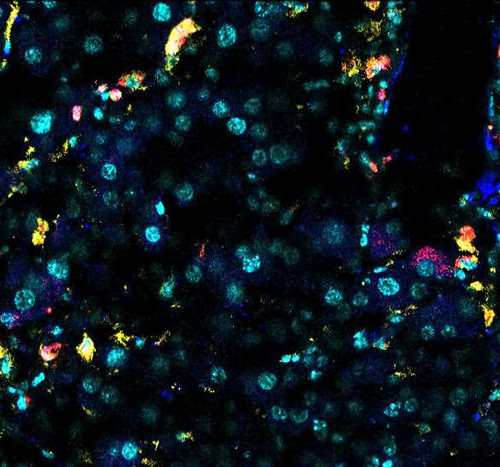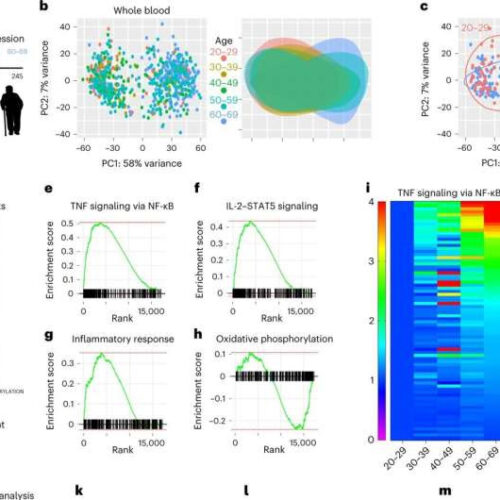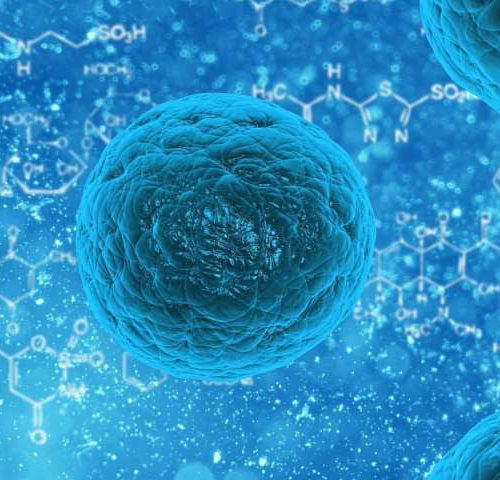Peer-Reviewed Publication MEMORIAL SLOAN KETTERING CANCER CENTER AN IMMUNOFLUORESCENCE IMAGE OF AN AGED MOUSE LIVER. EXPRESSION OF Β-GALACTOSIDASE (WHITE) AND UPAR (YELLOW) IN SENESCENT CELLS SERVE AS TARGET FOR ENGINEERED CAR T CELLS. ELIMINATION OF THESE CELLS IMPROVED AGE-RELATED METABOLIC DYSFUNCTION. CREDIT: MEMORIAL SLOAN KETTERING CANCER CENTER HighlightsLaboratory research led by MSK and Cold Spring...
Tag: <span>Age related diseases</span>
Inflammation discovery could slow aging, prevent age-related diseases
by Josh Barney, University of Virginia Age-related changes in whole-blood gene expression are associated with increased inflammatory gene transcription and decreased expression of genes encoding mitochondrial Ca2+ transport. Credit: Nature Aging (2023). DOI: 10.1038/s43587-023-00436-8 University of Virginia School of Medicine researchers have discovered a key driver of chronic inflammation that accelerates aging, a finding that could lead to longer, healthier...
How cellular protein factories may contribute to aging and age-related diseases
Research finds that the cellular assembly line that produces proteins can stall with age, triggering a snowball effect that increases the output of misfolded proteins. In humans, clumps of misfolded proteins contribute to age-linked Alzheimer’s and Parkinson’s diseases. Aging leads to a decline in cellular fitness and loss of optimal protein function. Many age-related ailments,...
Molecular atlas of senescent cells could chart way to therapies for age-related diseases and cancer
IMAGE: TOREN FINKEL, M.D., PH.D., DISTINGUISHED PROFESSOR OF CARDIOLOGY AND DIRECTOR OF THE AGING INSTITUTE AT THE UNIVERSITY OF PITTSBURGH AND UPMC. CREDIT: UPMC PITTSBURGH, Oct. 20, 2021 – Most cells throughout the body can divide and multiply to replace old cells and repair damaged tissue, but in response to certain stresses, cells can lose their ability to...
Taking on Harmful Cells That Contribute to Age-Related Diseases
A Tufts scientist is testing senolytics to counter senescent cells that promote afflictions like arthritis and Parkinson’s disease It’s not the fountain of youth, but a fast-emerging class of drugs could bring us closer to achieving the age-old quest for longer life, better health, and greater vitality. Image credit: Pixabay (Free Pixabay license) The drugs,...
Blocking enzyme’s self-destruction process may mitigate age-related diseases
by Perelman School of Medicine at the University of Pennsylvania Stopping the cannibalistic behavior of a well-studied enzyme could be the key to new drugs to fight age-related diseases, according to a new study published online in Nature Cell Biology. For the first time, researchers in the Perelman School of Medicine at the University of Pennsylvania show how the...
Exploring the effect of fasting on age-related diseases
by European Molecular Biology Organization There are many indications that fasting promotes longevity. In recent years, much attention has been devoted to so-called caloric restriction mimetics (CMRs), substances that simulate the health-promoting effects of fasting without the need of life-style change. In a study published in EMBO Molecular Medicine, a research team led by Oliver...
Abnormal blood pressure in middle and late life influences dementia risk
JOHNS HOPKINS MEDICINE In a study that spanned two and a half decades and looked at data from more than 4,700 participants, Johns Hopkins researchers have added to evidence that abnormal blood pressure in midlife persisting into late life increases the likelihood of developing dementia. Although not designed to show cause and effect, the study...
Neuronal Parkinson inclusions are different than expected
by University of Basel An international team of researchers involving members of the University of Basel’s Biozentrum challenges the conventional understanding of the cause of Parkinson’s disease. The researchers have shown that the inclusions in the brain’s neurons, characteristic of Parkinson’s disease, are composed of a membranous medley rather than protein fibrils. The recently published study in Nature Neuroscience raises new questions about the...
New experimental drug rapidly repairs age-related memory loss and improves mood
A team of Canadian scientists has developed a fascinating new experimental drug that is purported to result in rapid improvements to both mood and memory following extensive animal testing. It’s hoped the drug will move to human trials within the next two years. Gamma-aminobutyric acid (GABA) is a key neurotransmitter, and when altered it can...





